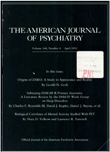Bipolar affective disorder and high achievement: a familial association
Abstract
The authors studied 442 probands with nonbipolar major depression, 64 with bipolar II disorder, and 88 with bipolar I disorder. Although the proband groups did not differ in occupational or educational achievement, the first-degree relatives of probands with bipolar disorders had significantly higher mean levels of achievement than did those of probands with nonbipolar disorder. This pattern applied whether or not the relatives themselves had bipolar illness. The authors conclude that the socioeconomic advantage previously associated with affective disorder in general may be limited to the bipolar forms.
Access content
To read the fulltext, please use one of the options below to sign in or purchase access.- Personal login
- Institutional Login
- Sign in via OpenAthens
- Register for access
-
Please login/register if you wish to pair your device and check access availability.
Not a subscriber?
PsychiatryOnline subscription options offer access to the DSM-5 library, books, journals, CME, and patient resources. This all-in-one virtual library provides psychiatrists and mental health professionals with key resources for diagnosis, treatment, research, and professional development.
Need more help? PsychiatryOnline Customer Service may be reached by emailing [email protected] or by calling 800-368-5777 (in the U.S.) or 703-907-7322 (outside the U.S.).



